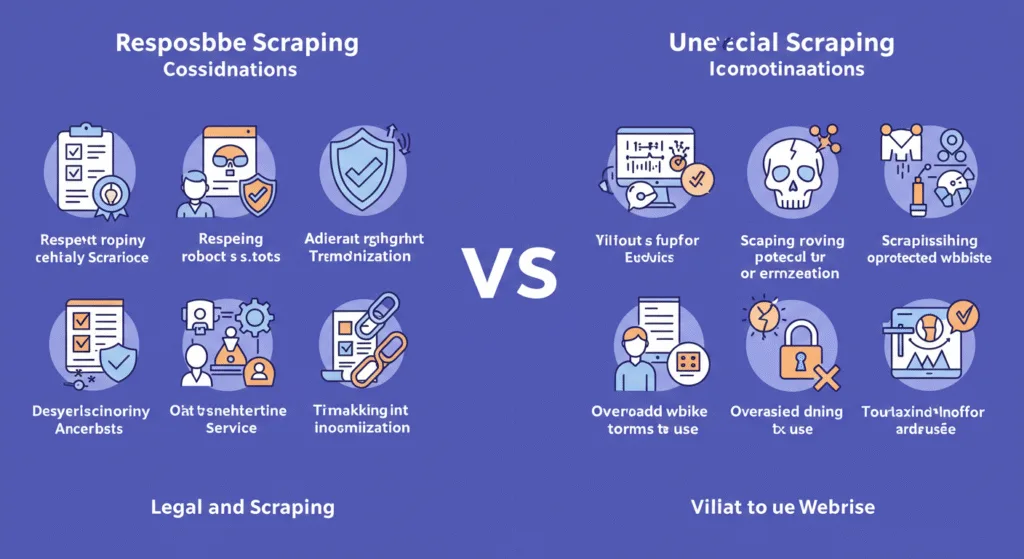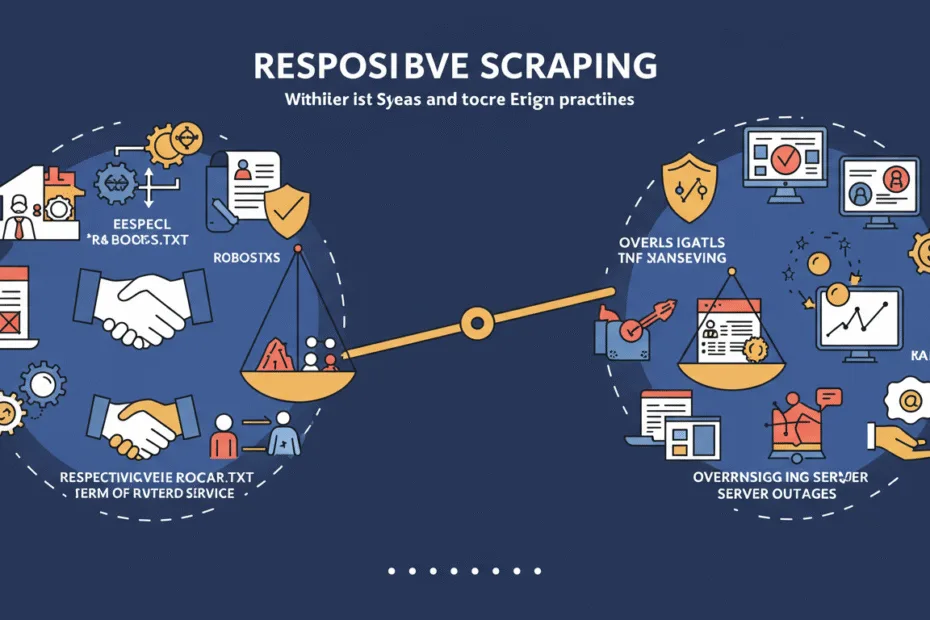Web scraping isn’t just a technical skill — it’s a powerful tool used across industries to drive decisions, optimize strategies, and gain competitive insights.
In this section, you’ll discover real-world applications of web scraping in:
- E-commerce
- Market research
- Finance
- Academic research
- SEO & digital marketing
- Government and public data
Let’s explore how organizations are putting this technology to work.
🛍️ 1. E-commerce and Price Monitoring
One of the most popular uses of web scraping is in the e-commerce industry , where companies monitor competitor pricing, product availability, and customer reviews.
🔍 Use Cases:
- Dynamic Pricing : Adjust prices based on competitors.
- Inventory Tracking : Monitor stock levels across platforms.
- Review Aggregation : Collect and analyze customer feedback.
📌 Example:
Amazon sellers scrape competitor sites like Walmart and eBay to adjust their own pricing strategies automatically.
📊 2. Market Research and Competitive Intelligence
Businesses use web scraping to gather large volumes of data for market analysis , trend forecasting, and strategic planning.
🔍 Use Cases:
- Brand Mentions : Track where and how often your brand is mentioned online.
- Product Trends : Identify emerging products or services based on online listings.
- Job Market Insights : Scrape job boards to understand hiring trends and salary ranges.
📌 Example:
A startup scrapes LinkedIn and Glassdoor to analyze remote work adoption across industries.
💰 3. Financial Data Extraction
Financial institutions and fintech companies rely on web scraping to collect real-time data for investment decisions, risk assessment, and compliance.
🔍 Use Cases:
- Stock Market Data : Pull live stock prices and news sentiment.
- Loan Rates : Compare interest rates from banks and lending platforms.
- Credit Risk Analysis : Gather alternative data sources for credit scoring models.
📌 Example:
An algorithmic trading firm scrapes news headlines and economic indicators to feed into AI-driven trading systems.
🧪 4. Academic and Scientific Research
Researchers use web scraping to gather large datasets for analysis in fields like social sciences, linguistics, economics, and environmental science.
🔍 Use Cases:
- Social Media Sentiment Analysis : Scrape Reddit, Twitter/X, or forums to study public opinion.
- Historical Data Collection : Extract historical records from digitized archives.
- Environmental Monitoring : Scrape weather or pollution data from open government portals.
📌 Example:
A university team scrapes climate-related tweets to study public perception of global warming over time.
📈 5. SEO and Content Marketing Automation
Web scraping plays a critical role in SEO and content marketing , helping marketers stay ahead with data-driven insights.
🔍 Use Cases:
- SERP Scraping : Monitor keyword rankings and featured snippets.
- Content Gap Analysis : Discover topics competitors are covering but you’re not.
- Backlink Profiling : Analyze backlinks of top-ranking pages to improve link-building strategy.
📌 Example:
A content agency scrapes Google Search Engine Results Pages (SERPs) to determine which topics are trending and should be prioritized.

🏛️ 6. Public Sector and Open Data Initiatives
Governments and NGOs use web scraping to gather and centralize publicly available data for transparency, reporting, and policy-making.
🔍 Use Cases:
- Real-Time Dashboards : Scrape health or disaster response data for visualization.
- Open Data Aggregation : Combine information from multiple official sources.
- Policy Impact Analysis : Track legislative changes and related discussions.
📌 Example:
During the pandemic, many organizations scraped official health ministry websites to create centralized dashboards tracking cases and vaccine rollouts.
🚀 Bonus: Emerging Uses of Web Scraping
As AI and machine learning grow, so does the demand for high-quality training data — and that’s where web scraping shines.
🔥 New Frontiers:
- Training Machine Learning Models : Scrape text, images, or videos for NLP or computer vision tasks.
- Lead Generation : Extract contact info from business directories for sales outreach.
- News Monitoring : Build alerts for breaking news or mentions of specific keywords.
📌 Example:
A startup scrapes GitHub repositories to train an AI code assistant.
🎯 Summary Table: Real-World Use Cases
| Industry | Application | Tools Used |
|---|---|---|
| E-commerce | Price monitoring | Python, Proxies |
| Market Research | Trend analysis | No-code tools |
| Finance | Stock and loan data | APIs + scraping |
| Academia | Social media analysis | Selenium, CSV export |
| SEO | SERP analysis | Requests + BeautifulSoup |
| Public Sector | Health dashboards | Scraping + visualization |
🧾 Conclusion and Final Tips
Congratulations on completing this comprehensive guide to web scraping !
You’ve journeyed from understanding what web scraping is, how it works, and its legal implications, all the way through building your own scraper in Python and exploring real-world applications.
Now that you’re equipped with both foundational and advanced knowledge, let’s wrap things up with some final thoughts, best practices, and resources to help you continue growing in this powerful data-driven field.
✅ Key Takeaways
Let’s recap the most important points from this guide:
- Web scraping automates the extraction of structured data from websites.
- It has wide-ranging applications across e-commerce, SEO, finance, research, and more.
- While public data scraping is generally legal , always respect robots.txt , Terms of Service, and privacy laws like GDPR.
- Choose the right tool based on your skill level and project scope — from browser extensions to custom scripts and cloud platforms.
- Learn to bypass anti-scraping tactics like CAPTCHAs and IP blocking using proxies , headers, and JavaScript renderers like Selenium.
- Always scrape ethically — avoid overloading servers, rotate IPs, and don’t extract sensitive or personal information without permission.
💡 Pro Tips for Successful Web Scraping
Here are some expert tips to ensure your scraping efforts stay effective, ethical, and sustainable:
📌 1. Start Small and Scale Gradually
Don’t jump into complex projects right away. Test your scraper on a small subset of pages first.
📌 2. Add Delays Between Requests
Use time.sleep() to mimic human behavior and prevent getting blocked.
📌 3. Use a Rotating Proxy Service
Avoid IP bans by rotating residential or datacenter proxies during large-scale scraping.
📌 4. Monitor Changes in Website Structure
Websites change often. Regularly test and update your scrapers to match new HTML structures.
📌 5. Store Your Data Securely
Use databases like SQLite, PostgreSQL, or CSV files depending on your storage needs.
📌 6. Respect Robots.txt and Website Policies
Always check the site’s robots.txt and ToS before scraping.
📌 7. Keep Learning and Building
Web scraping is a skill that improves with practice — build scrapers for different use cases and challenge yourself regularly.
🚀 Next Steps: How to Keep Improving
Ready to go further? Here are some actionable ways to deepen your knowledge and improve your scraping game:
- Learn API Crawling : Many sites offer APIs that provide structured data more reliably than scraping.
- Explore Machine Learning Integration : Use scraped data to train NLP models or price prediction engines.
- Join Communities : Engage with developers on Reddit, Stack Overflow, or Discord groups focused on scraping and automation.
- Contribute to Open Source : Look for open datasets or tools on GitHub where you can contribute.
- Automate Workflows : Combine scraping with tools like Airtable, Zapier, or Make (Integromat) for full automation pipelines.
🎁 Bonus Resources
Here are some handpicked tools and learning materials to support your journey:
🛠️ Tools & Libraries:
- Python.org – Official Python website
- BeautifulSoup Docs
- Scrapy – Powerful scraping framework
- Selenium – For JavaScript-heavy sites
- ParseHub – No-code alternative
- Bright Data – Enterprise proxy service
📘 Tutorials & Courses:
- Real Python – Web Scraping Tutorials
- Udemy – Python for Web Scraping
- Coursera – Applied Data Science with Python
🧑💻 Communities:
- r/webscraping – Reddit community
- Stack Overflow – Ask Python scraping questions
- Discord channels for Scrapy or Bright Data users
📢 Thank You & Stay Connected!
Thank you for reading this complete guide to web scraping . Whether you’re a marketer looking to boost your SEO strategy, a developer building AI models, or a researcher collecting insights, we hope this guide has empowered you with the tools and knowledge to succeed.
If you found this useful, consider sharing it with others who might benefit.
📖 Want More?
Here are some related posts you might enjoy:
Related Article:
Part 1: Web Scraping ! The Ultimate Guide for Data Extraction
Part 2: Web Scraping! Legal Aspects and Ethical Guidelines
Part 3: Web Scraping! Different Tools and Technologies
Part 4: How to Build Your First Web Scraper Using Python
Part 5: Web Scraping Advanced Techniques in Python
Part 6: Real-World Applications of Web Scraping
Happy scraping! 🕵️♂️📊🖥️
